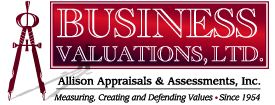Criteria for Selecting A
Business Valuation Provider
“You need a business valuation” is the statement made to just about every business owner eventually by an attorney or a CPA. There are many reasons for business appraisals from estate planning to mergers, acquisitions, partnerships, ESOP’s and a laundry list of other motivations.
For business owners needing their first business valuation, the following list will provide a discussion of some of the criteria that needs to be considered in selecting a firm to provide your business valuation.
Specialization: Does the provider specialize in performing business appraisals or is this a sideline conducted during the downtime after tax season? While many CPA’s can and do perform business appraisals, many do not during the peak tax filing periods. Keeping on top of the various business valuation analysis methods, tax regulations, business valuation court cases and changes in the market place is a full time effort.
Experience: How many business valuations does a provider do each year is an important question to ask. If an appraiser performs 3-5 business valuations per year, is that appraisal to be as reliable as one done by an appraiser that conducts 20-25 business valuations or more per year. Some firms specializing in business valuations may conduct hundreds each year enabling individual appraisers to collaborate with colleagues on specialized situations.
Appraisal Methods: This may influence completion timeframe with twenty working days ideal. Performing a business valuation is not simply an exercise of applying a pricing multiple to earnings or revenues figures. Regardless of the industry averages, a company’s value will depend on factors such as the talent of its management team, revenue growth trends, competition, markets, geography, concentration of clients, executive compensation, board composition and a list of other criteria. Providers with more diverse and comprehensive experience will create the assessment that is credible to all parties (including the tax courts).
Recourse: Business valuations can be challenged by the IRS or opposing counsel. Should there be a challenge, will your business valuation analyst represent you in court and will they be qualified as an expert witness.
Qualified Appraiser: Business valuations in their very essence are to be third party independent evaluations. According to tax regulations, there is a conflict of interest when the appraisal is completed by a person employed for other services by the client and who does not perform most of his or her appraisals for other clients. Many CPA’s who provide tax, audit and other financial services for a business owner may be qualified to do a business appraisal but will require the work be completed by an independent business valuations expert. Ask who specifically will be doing the work (research and analysis).
Track Record: Asking a provider how many business valuations they have completed, how many have been challenged and the outcome of those challenges will provide added insight.
Fees: Since most projects require twenty or more hours for completion, be mindful of whether the low cost equates to a questionable, unsupportable result. With few exceptions, report fees of $2500, $3500 or even $4500 suggest unrealistic hourly rates at $125 to $225 for over 20 hours of work or more. Seasoned valuators commonly charge $250 to $400 an hour. However, that added experience equates to requiring less, not more time to do good work. Think of the professional as a surgeon with the degree of successful surgeries, not how much s/he charges. It will be money well spent and worth the peace of mind.
There are very specific requirements that must be met for a valuation to be accepted by the tax and legal communities. Opinions that are not thoroughly documented open up the valuation to dispute. Selecting the right business valuation expert can make the difference between smooth sailing in the future or rough seas.
